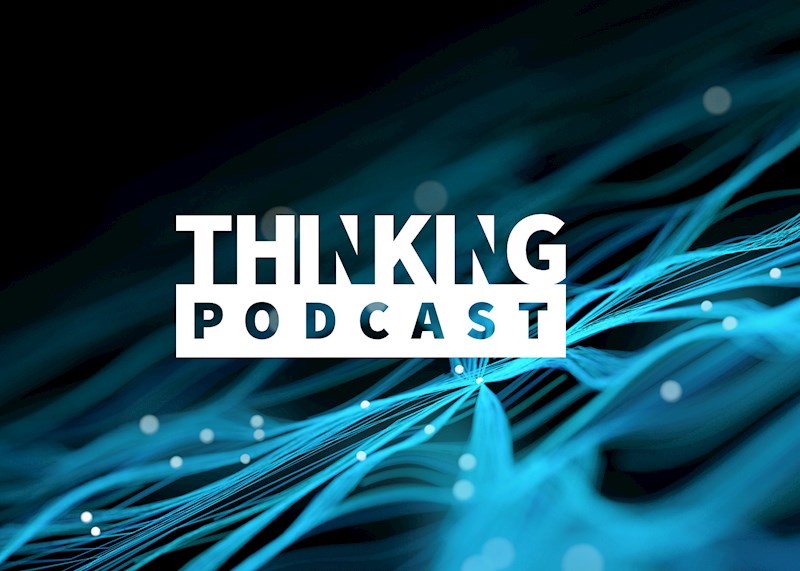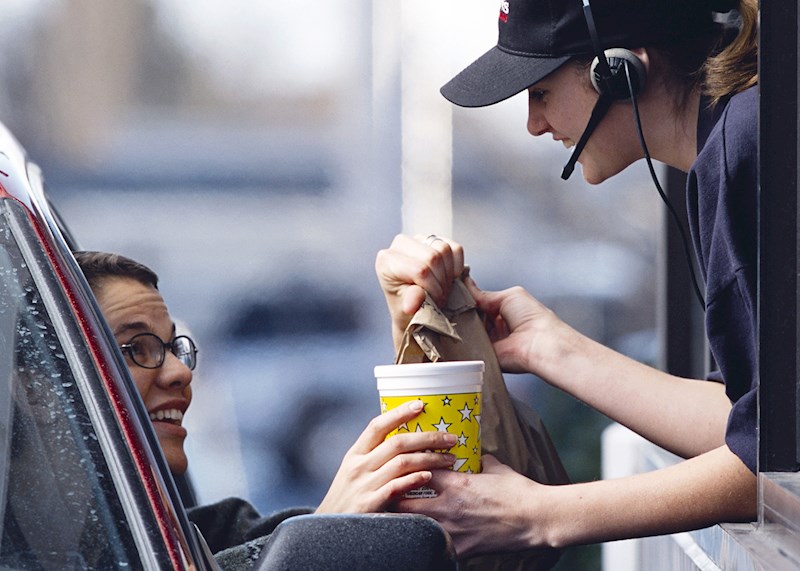Sharon Zackfia, head of consumer research at William Blair, shares insights from over a decade of Glassdoor data to reveal how culture, leadership, and operational models—not just pay—shape employee satisfaction and long-term brand success in the restaurant sector.
Subscribe here: Spotify | Apple Podcasts | Amazon Audible
Podcast Transcript
00:05
Chris T
Hey everybody. Welcome back to William Blair Thinking Presents. Today is Monday, June 23rd. And we're joined once again by William Blair's group head of consumer research Sharon Zackfia. Welcome back. Good to have you.
00:32
Sharon Z
Thanks, Chris.
00:33
Chris T
So Sharon and her team recently released their fourth longitudinal analysis of employer ratings of major restaurant chains on Glassdoor. This is a report that assesses who is winning the war for talent It highlights several key themes, including employee satisfaction, leadership, compensation, company rankings. And you know, they've they've been collecting this data annually from Glassdoor since 2015. So it's become quite comprehensive.
So Sharon, before we get into this report at the granular level, do you mind providing a high level overview of what's in the report and then maybe just talk about why you and the team continued to collect this data year after year?
01:09
Sharon Z
Sure. Happy to do so. So we've been collecting the data now for 11 years. It's over half a million reviews that we look at for nearly 90 restaurant concepts. And really what we're trying to see here is, you know, over time who's kind of winning the war here for talent. I think, you know, restaurants are unique and in retail in terms of the customer experience really trumping everything else.
Typically in the eyes of the consumer. And that customer experience many times boils down to, you know, who served you, who created your food, right? Was it after it? Was it fast? Did they do it with a smile? And those things are hard to, to standardize. And, you know, certainly we've seen, customer satisfaction, speed, order accuracy, all really correlate with staff tenure and manager tenure.
And that's really what we're looking at. And we're looking at it longitudinally because, you know, there is some bias. And looking at, self-reported reviews. So, you know, people might be, more bar belled at the high end or low end of what they're, up to, say, online. But if you're looking at it at a longitudinal basis, you know, directionally should tell you, you know, who's improving and who's worsening in this, regard.
02:35
Chris T
Let's dig in a little bit. First, the data shows that culture and values have a 89% correlation with employee satisfaction. So that's way ahead of compensation. What do you do with culture is such a sticky driver of happiness, especially in high turnover environments like restaurants?
02:51
Sharon Z
Yeah, I think culture doesn't change quickly. So, you know, it in and of itself is sticky. I think when you get it right in any environment, restaurants or other types of businesses, it's just a more, joyful working experience. And I think in the restaurant space that manifests, outwardly to the consumer in a way that might be more direct than other kinds of businesses.
You know, I suspect if we did this survey for financial institutions or any other kind of institution, our business line culture would rank highly. It just happens to be that in this particular industry, that employee satisfaction tends to correlate really strongly with customer satisfaction. So you see it, you know, really manifest in the the top and bottom lines for concepts when they, when they get it right or when they get it wrong.
03:44
Chris T
So I can't call out specific companies. But one major chain topped the employee satisfaction chart again. It's been ten years straight. What's the secret sauce here? Is it just about pay or you know, is there something deeper in how they manage people?
03:57
Sharon Z
Yeah, I mean, I think it's a number of things. You know, it's a private, family owned business. So I think in that way they are able to play the long game and not necessarily the, the short game that, that, you know, public companies might have to, try to satisfy with investors or some private equity backed, companies might have to satisfy with their sponsors.
04:21
Sharon Z
It's also a business where they have chosen not to franchise. So they, they own the employee experience. Right? They have not outsourced that. And I think their ability and generally the ability to perpetuate culture is a bit easier. Company owned business model. Because again, you're you're owning that employee experience. And I think this particular concept being familial in nature of the ownership and then also having this company on business model has been able to kind of scale a culture as it's gotten, bigger over time, the concept, in a way that the some others haven't been able to do. And, you know, it's it's not easy to be at the top of this list for, for ten straight years. And, you know, over 90% of employees said they would recommend their job to a friend, which is pretty phenomenal when you're considering this is the restaurant industry.
05:16
Chris T
So a few names crack the top ten for the first time this year, I think ever. What kind of internal shifts, whether in management pay or values, typically drive that kind of leap?
05:24
Sharon Z
Yeah. I think it's a progression to the leap. Right. We definitely have seen, you know, CEO changes that can be catalysts at the top either good or bad. You know sometimes they don't imminently kind of translate into a concept moving tremendously in the ratings because you might have some necessary turnover, you know, when a new CEO comes on board. But within a few years, oftentimes you'll see some change in sentiment. I think in some of the companies that we saw crack the top ten, there was leadership changes that happened. You know, within the last several years. And I think there's been just more of a focus as pay has gone up across the restaurant industry on what else can we do for our employees.
You know, it's hard to just win on pay. Because pay is kind of almost a given these days. In markets where minimum wages are so high. So there are things like helping you choose your own schedule, which, again, is not immaterial. And the restaurant space, you know, having the ability to architect your own schedule is important. Other kinds of offerings like tuition assistance and so on can be very meaningful in this industry.
06:44
Chris T
You mentioned CEOs. We saw some of the biggest swings in CEO approval this year, up double digits in some cases. And, you know, down sharply in others. How much does that metric reflect real cultural change? Versus just, you know, perception.
06:58
Sharon Z
So I think given that the survey is really geared towards hourly employees at the unit level, oftentimes CEO change can come with a lot of operational change. And that can be negative at first because, you know, you're basically telling people to change the way they're working. And then over time can, can, not always, but can shift to a positive as the employees start to see the manifestation of the change impact their business.
I think, you know, the biggest, immediate change you can see is if there is a leadership change where the employee feels like they're being listened to in a way they haven't been listened to before, you know, you certainly hear frustration sometimes at the unit level, like, if only they would do this, if only they would do that.
And when there's somebody on the top that's out in the field and listening to that, that's where you can see the faster movements and correlation with overall employee satisfaction.
08:05
Chris T
So casual dining, you know, led overall satisfaction again. But specialty was the only subsector to improve year over year. What's going on there? Is it about pay pace or something else?
08:17
Sharon Z
A specialty is is really a specialty beverage for a large, majority of the companies here. There are also some, some dessert concepts, but it's dominated by specialty beverage. And I think that's where we've seen a lot of the movement. And I'd say the war for talent there is exceptional. And I think every company within specialty coffee and specialty beverage has really upped the ante and culture and what they do in that space.
And I think that has also created a improved customer experience. And look, I mean, in some ways it's a little bit easier as well to have a better employee experience in beverage because you don't smell like french fries at the end of the day. Right? Your hours tend to be better than in some other industries. But, you know, I'll give credit to a lot of the concepts in this space for really making giant leaps, really, and how they're treating their employees. And, and I think the upward mobility of those employees is also a key factor because many of these concepts are growing very quickly now.
09:18
Chris T
Hourly pay, which was shown to have tripled in some segments since 2015. But there's still a big gap between coastal and central regions. How much of that is market driven, do you think, versus brand strategy?
09:29
Sharon Z
Yeah, I think I think it's largely market driven. I mean, if you look really across, the West Coast, the northeast, and, you know, urban areas versus suburban areas, you just have higher wage structures. You know, there are many cities that have higher minimum wages. So that just creates upward pressure across the entire pay spectrum. And then, you know, certainly, many of the blue states have a higher mandatory minimum wages, which creates upward pressure.
09:55
Sharon Z
So I think the biggest dynamic has been, you know the regional mandated wages, but certainly labor in general has been tough to find. And so even in states where traditionally the minimum wages have been quite low, you still seen pretty material wage changes over the past five years.
10:14
Chris T
You may have answered this one already. But I'll ask it anyhow. You know, the top seven highest paying concepts are all beverage focused. So my question is, is that a signal of higher labor competition in that niche, or is it just a different operating model?
10:28
Sharon Z
Yeah, I mean, it is interesting because in that beverage category, the number one cost component is labor, not not the cost of the actual product you're serving. So it is a little inverse from some other sectors. And so and it's always been that way. But I think it does go to a show like what consumers are valuing in that equation.
It's not just the product, it is also the experience as encapsulated by the service. And I think that is then, you know, part of the reason we've seen so much investment from those concepts in the labor pool.
We're also seeing, as I mentioned, really strong growth across some of the brands there. And so, it's not uncommon to be promoted very rapidly at some of these concepts because of how quickly they're growing. And I think all of that, kind of comes through to the consumer and a very, very positive experience.
11:23
Chris T
One brand. And, you know, I wanted to call this one out, used to be a benchmark for employee experience. This year it hit an all time low in satisfaction. What would you say are the warning signs that a culture is is slipping? And, you know, how does, how does a business like this course correct?
11:39
Sharon Z
So I think, I mean, with, with this particular concept, they've had, you know, three different CEOs over the last three years. So there's been a lot of leadership change. I think that creates directional ambivalence at the unit level. You know, hopefully that'll change. Going forward and we'll see more stability at the top. But certainly that's challenging, right at the unit level, because each leader has had a different, different set of strategic priorities.
I think, you know, the other element here is that it's, it's a concept that perhaps became more enamored of technology and less focus on the actual experience and the units. And, you know, they’re trying to course correct there, but it takes time. It's a very large concept, and it will take time to, I think, get the employee satisfaction kind of moving in the right direction. But, you know, hopefully we're we're going to see it trough soon.
12:35
Chris T
All right. So only two attributes, compensation and work-life balance, saw rising correlations with satisfaction this year. Does that suggest a shift in what employees are prioritizing post-pandemic? I don't know if it's a surprise or not, but you know, I did want to call this one out as I found it's somewhat interesting.
12:49
Sharon Z
Yeah, I mean, they're pretty minor shifts, I guess, is the way I would phrase it. So if you look at comp and benefits, I mean, it did go up. But you know, I think it's got a 71% correlation if you look back ten years ago was 81%. Right? So, so much lower. And work life balance is kind of been in that high 70s low 80s range. This year it was 81%. And if I look back ten years ago it was 82%. So I feel like that is it's kind of a steady, important attribute, in this space.
13:24
Chris T
Last question for you. So some brands have built a flywheel of employee advocacy, you know, year for year through these high net promoter scores. What's the formula for that kind of long-term loyalty.
13:35
Sharon Z
So I think it's it's going to sound simple. It's just not simple to to you know I think it's frankly listening to the employees in the field. Right. It's empowering the unit level managers to make the right decisions, to make the customer happy. It's ensuring the employee feels as if what's being done in the store is actually aligned with the values of the company, and that there's not a disconnect there.
And, I mean, ultimately, people who work in restaurants want the customers to be happy, right? And so when there are policies or, you know, procedures in place that impede that, it it creates, discontent. And so, you know, many of the dynamics of have managers are highly successful functional restaurant go along with having more satisfied employees.
I think listening to what would make employees jobs easier. Right. Everybody wants their job to be easier so they can spend more time on the things that matter. That goes a long way as well. You know, it's not there's not like one common underlying dynamic amongst the concepts that are doing the best other than, you know, a key focus on the employee experience and really listening to what the employees are telling them.
Because, you know, ultimately the employees are the they're really the funnel where you can hear what the consumers are liking and not liking about the concepts. And and so it's a it's hard to do in reality. But, some of these companies make it look easy.
15:06
Chris T
All right. Well Sharon, that's all the time we have for today. For those interested in reading the full report you can request a copy by reaching out to us at WilliamBlair.com/contact-us. Thanks again for joining us.
15:16
Sharon Z
Thank you Chris.
15:17
Chris T
Yeah you’ve got it.



